- Lifestyle & Sports
- 20 Apr 22
The Full Hot Press Interview with Labour Leader Ivana Bacik

Recently elected as the leader of the Labour Party, Ivana Bacik may have to perform miracles to bring the party founded by James Connolly back to its former status as a political force in Ireland. Here, the Dublin Bay South TD talks about the key issues of the day, including the upcoming review of abortion legislation, the housing crisis, the separation of Church and State, representation of women in the Dáil, the Russian invasion of Ukraine, condemnation of Saudi Arabia – and the question of coalition with Sinn Féin.
Denise Chaila and Rejjie Snow were not on my list of topics to be discussed when I went to meet Ivana Bacik outside Leinster House on a sunny April afternoon. But the newly appointed leader of the Labour Party was only too ready to sing their praises.
She had caught Denise’s acclaimed 3Olympia Theatre headline show a couple of weeks previously – “Absolutely brilliant,” she enthused – and was already in possession of tickets to see Rejjie Snow on April 12th. I thought of asking her to do a review for Hot Press I'd imagine she has more pressing things on her mind right now.
Ivana Bacik has been leader of the Labour Party – she is just the 14th since its formation in Clonmel, Co. Tipperary in 1912 by James Connolly, James Larkin and William O’Brien – for two weeks now. It is a job she must have dreamed about all her life. And, after a long, and sometimes strange trip, her accession to it came about in circumstances that were both sudden and dramatic.
Ivana has been involved in politics since her student days. She was a key figure to a generation of young Irish students when, as President of the Students’ Union in Trinity College, she campaigned vocally for contraceptive and abortion rights for Irish women. She had a case taken against her by the anti-choice lobbyists SPUC – who had been responsible for the insertion of the now notorious 8th Amendment to the Constitution – for supplying abortion information to students at a time when women were being relentlessly pressurised and targeted on the issue by right-wing activists.
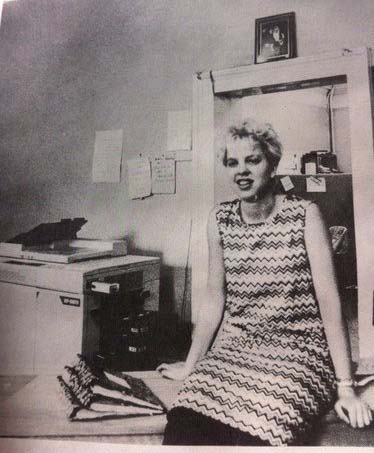
Ivana faced a potential stint in jail, but she screwed her courage to the sticking post and, with the help of the future President of Ireland Mary Robinson, fought the case in the European Court of Justice. Eventually, SPUC were vanquished and Bacik could breathe easily at night again. And sleep. The stand she took was vital, sowing the original seeds of the campaign that would later remove the brutally ill-conceived and coercive 8th Amendment from the constitution in 2018.
That auspicious start inspired her to run for the Senate, in the Trinity College constituency. She fell short in 1997 and 2002, but was eventually elected in 2007. She subsequently ran for election to the Dáil and to the European Parliament unsuccessfully, but consistently retained her position in the Senate representing Trinity alumni. Then, in July of last year, history beckoned. The former Fine Gael Minister Eoghan Murphy decided to resign his seat in Dublin South-East (now Dublin Bay South). It is an area in which Ivana Bacik grew up and lives. She was selected to run for Labour.
Ivana Bacik received over 30% of first preferences. On the other hand, Labour continued to do badly in the polls, running in or around the 4% to 5% mark. There is no doubt that party leader Alan Kelly was hamstrung by the effects of the pandemic, but the feeling was growing within Labour that, if things were allowed to remain that way, then at least some of the sitting TDs might lose their seats in any upcoming election. Members of the parliamentary party decided that a change of leader was needed.
All of the other potential contenders rowed in behind Ivana Bacik. She was duly elected leader of the Labour Party. The question now is: can she do what is necessary to revive the fortunes of the party in time for the next general election? Given where Labour currently stands, it is a mighty challenge.
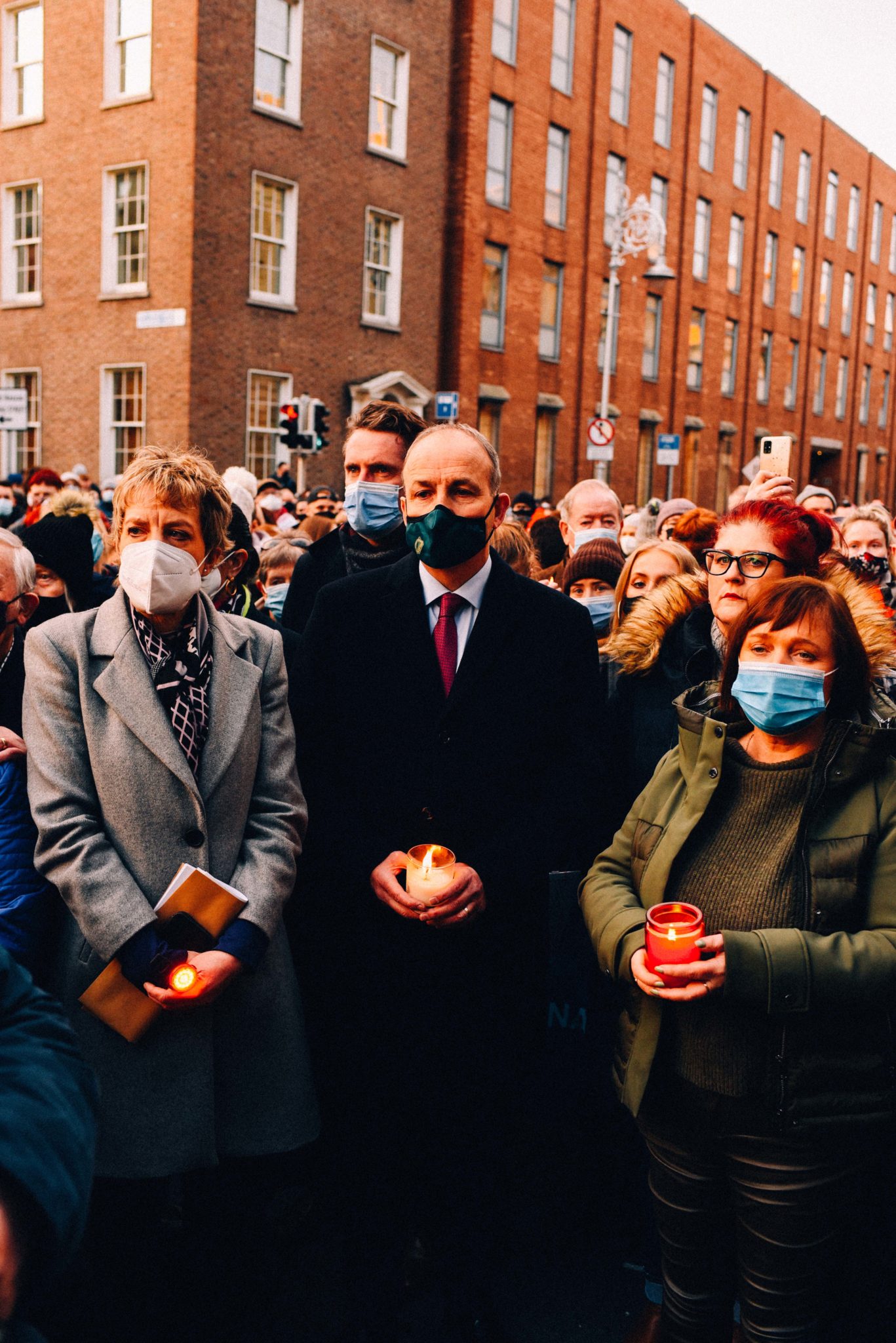 Ashling Murphy vigil at the Leinster House, Dublin. Friday 14th of January 2022. Copyright Miguel Ruiz.
Ashling Murphy vigil at the Leinster House, Dublin. Friday 14th of January 2022. Copyright Miguel Ruiz.ABORTION LEGISLATION REVIEW
We begin by talking about abortion. Many in Irish political life joined in the campaign only in its final stages, when they saw where the momentum was heading. Indeed, in the North, as recently as 2021, Sinn Féin failed to vote against a DUP bill designed to outlaw abortions in cases of ‘non-fatal disabilities’, leading to accusations that they were speaking out of both sides of their mouth on the issue. Meanwhile, whatever impression their leaders might like to give now, Fianna Fáil and Fine Gael were both badly split on the issue, and ultimately out of step with voters. In contrast, Ivana Bacik had been active on abortion rights since the 1980s.
“I was active on that issue for many years,” she nods. “When you’re going through those decades, you don’t know how it’ll turn out. I was just so heart-warmed to see the groundswell of support in 2018. Also, to see the new generation of women in action, because for a long time, small numbers of my generation were the only visible pro-choice group taking to the streets in Ireland up until the late ‘80s. It was great to be a part of the 2018 campaign.
“I was on the National Executive of ‘Together For Yes’, and we’d learned so much from Marriage Equality and other campaigns,” she continues, referencing the successful landmark 2015 vote Constitutional change. “It’s easy to say that retrospectively, but when we were in it, right until the end, we still couldn’t be sure we would win through on Repeal. We certainly didn’t think that we’d get such a big majority. You never know with a referendum because it can turn very quickly. Things can happen in the last week that can change the outcome.”
Four years on, The National Women’s Council and the Abortion Working Group are still advocating for legal changes that will address barriers to abortion healthcare and ensure equitable access. The list of hospitals not carrying out the appropriate services is long, the effect of which is that those in a less privileged economic bracket – including migrants, those with disabilities and people from minority ethnic backgrounds – experience real difficulties accessing abortion in Ireland.
The current rules specifying a three-day waiting time, along with a 12-week limit on when abortions can be carried out, often mean that by the time a person realises they’re pregnant, it’s too late. As a result, the country now faces another defining moment as the operation of the Health Act 2018 comes up for review.
“As it happens, I’ve just finished Labour’s submission to the abortion legislation review,” Ivana Bacik says. “We recommend that the Minister for Health abolish the three-day waiting period, revise the 12-week limit, and the definition of fatal foetal abnormality, as well as take out some of the onerous restrictions for women’s access to healthcare. I’ve included a part about the lack of geographical coverage. I’ve worked with the Irish Family Planning Association and it’s clear that there’s still gaps in the service, but there was a seismic shift all the same.
“For somebody my age with teenage daughters, to be in a position now where we’re having a discussion about how we can improve reproductive healthcare is amazing. We have abortion, it’s legal and the referendum was won by a majority vote. But what we also pushed for in 2018 was safe access zones. There’s a lot of unnecessary barriers to dismantle.
“The other issue is that of class,” she adds. “Abortion is always a class issue as well as a gender one. The most desperate women and girls who called me when I was 21, in the students union of ’89, were those who couldn’t afford to travel to England. They didn’t have the supports needed. Economic rights are a key point in reforming the law. The last bill I did in the Seanad before I was elected to the Dáil was to do with Reproductive Healthcare Leave. That would enable a woman who’s had an early miscarriage to avail of 20 paid days leave, or any employee of any gender who needs to take time off work for reproductive healthcare reasons such as an abortion or IVF. We actually have support from the government, so we’re going to push for that now.”
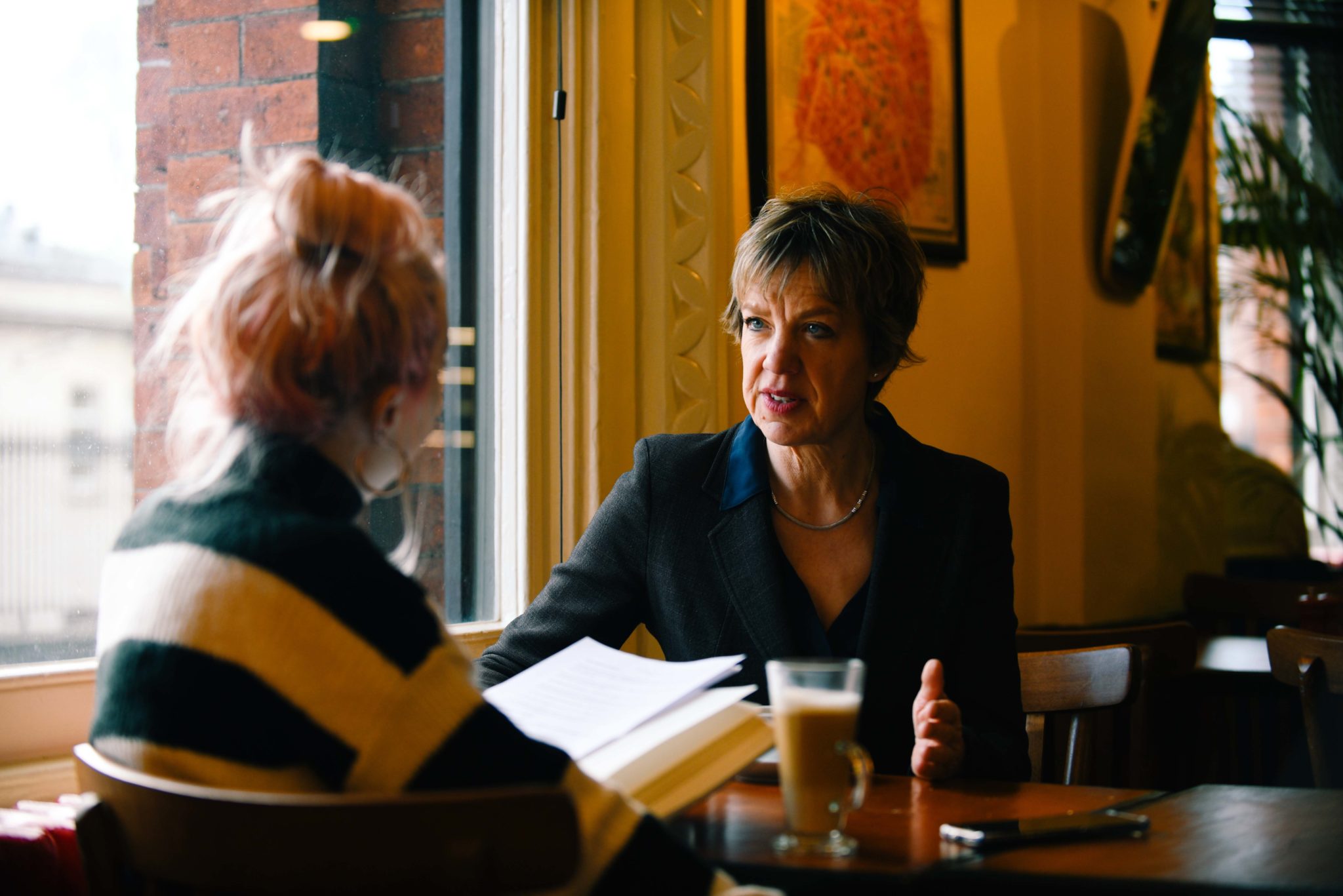 Ivana Bacik. Copyright Miguel Ruiz.
Ivana Bacik. Copyright Miguel Ruiz.Ireland has also been criticised for its abysmal lack of healthcare for trans people.
“The first thing to do for the trans community is to fund adequate services,” she says emphatically. “Labour pushed really hard for the Gender Recognition Act in 2015.”
Ivana mentions working with Dr Lydia Foy, whose pioneering case seeking a new birth certificate and legal recognition for her female gender paved the way for that legislation.
“Things have already moved on,” she adds, “but for its time, that law was very progressive. It’s not so much legislative change that’s needed right now as actual resourcing of services. Although health services are important, it’s also about education, especially the issue of transphobic and homophobic bullying. There’s a lot to do beyond Marriage Equality on the ground and in schools. The Gender Equality Committee is looking at education programmes which would allow schools to tackle RSE and LGBT issues on a discretionary basis. So healthcare and education are probably the two key areas.”
VAST BILLION-DOLLAR BUSINESS
Ivana Bacik, and indeed the Labour Party generally, have campaigned strongly against the Sisters of Charity or their proxies having any involvement in the National Maternity Hospital. It is Labour Party policy that full public ownership of the hospital is the only viable solution to the current impasse. She takes a similar view in relation to the involvement of religious interests in education.
“I’ve always believed in the need to separate Church and State in the provision of education,” she says. “One of the achievements I’m most proud of is the establishment of the first multi-denomination school in Ireland that came from a Catholic school, under the transfer of patronage model. It’s the successful and thriving Dublin 8 school in Rialto. The huge problem is that the Catholic Church or religious orders still own the vast bulk of school buildings and premises. The State funds the teachers and pays the maintenance but there’s no ownership of the buildings.
“There’s still a battle going on about the religious orders not paying the amount they owed for the unpaid redress,” she adds. “I was a barrister for many years and I used to represent survivors of abuse in industrial schools, so I know the system from the inside. It’s just so difficult to try and extract the money out of the religious orders. They’re still sitting on huge tracts of land and buildings. That’s a really difficult issue. I was brought up Catholic myself but I think I might be the first Oireachtas member to be a card-carrying atheist!”
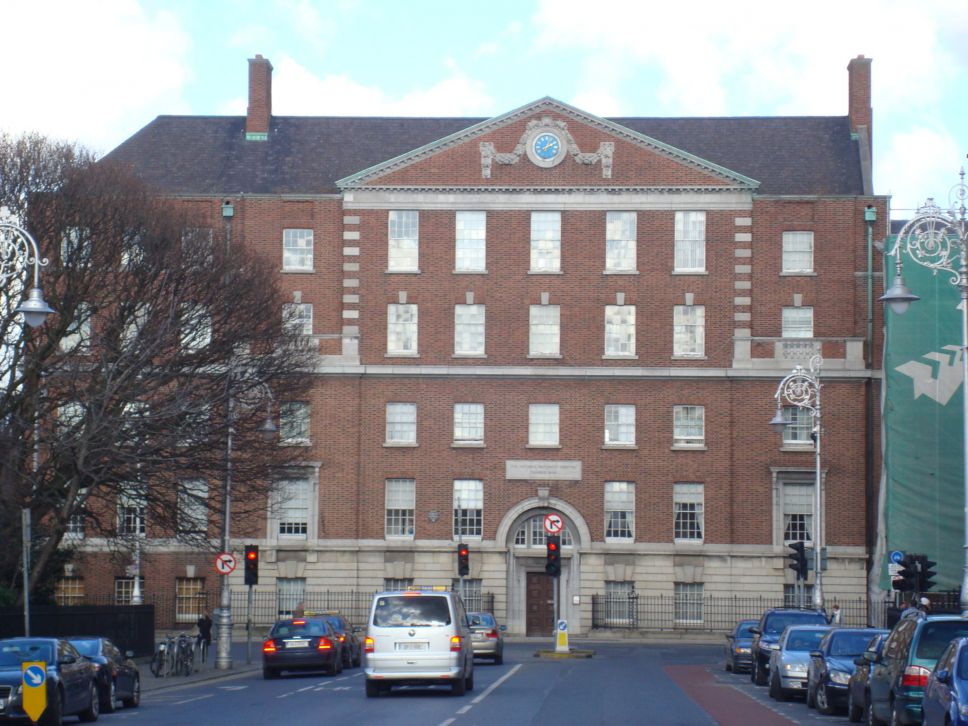
There is one issue on which Ivana has taken a position, which some interests see as being too close to the Church and to the religious orders. In November 2019, she spoke at a conference run by Ruhama, an Irish NGO which was set up by religious orders. The charity aims to ‘support’ women who have been affected by ‘prostitution and sex trafficking’, but the Sex Workers Alliance of Ireland (SWAI) have accused the group of having a moralistic and judgemental take on the sex trade. Ruhama often insist that sex work is an industry solely based on coercion and trafficking, rather than a choice by someone with agency.
“Look, I’ve seen the critiques of Ruhama,” Ivana says. “It’s interesting, because for a long time in Ireland, the Church and religious orders were the shadow welfare state. For generations, Ireland has been seen to outsource the care of vulnerable populations to the religious. While I’m always very critical of religious orders, particularly when I see the effects of survivors of abuse represented, it was a State failing. The state handed that responsibility over, and continues to do it. There’s some really good work being done by religious orders, and I would always acknowledge that too. The Dominican convent in Wicklow is housing Afghan refugees. A lot of the organisations that are doing very important work like Vincent de Paul, Trócaire and the Immigrant Council have some religious background to their setting up, establishment or funding. I favour a secular State but unfortunately, that’s Irish history, that’s our legacy.
“Having said all that,” she says, “I happen to support the view of prostitution as exploitation. I’ve represented women being charged with offences, I’ve fought really hard to decriminalise women selling sex on the street, but I absolutely stand over the Nordic Model that criminalises the purchaser of sex. Let me just say why. I know there’s a whole narrative that this is ‘sex work’ and so on, but the trade union movement and feminist NGOs as well as Ruhama all joined the Turn Off The Red Light campaign based on the evidence before us. I was on the Justice Committee which took evidence from both sides, including women who were engaged in the sex trade as well as survivors of sex trade.
“The evidence before us was that at least 80% of those in the sex trade are migrant women from disadvantaged backgrounds who have been coerced or trafficked into selling sex. To say it’s a free choice and that women should be able to sell their bodies if they wish to — and it is predominantly women, and it’s always men who buy — is a very liberal argument to me. I used to believe it myself by the way. When I was in my twenties, that was my view of prostitution but I changed my view over the years.
“On the Justice Committee, we heard from those who said, ‘This is my choice’ but for me, as a socialist, it’s about looking at the collective. It’s about looking at the gendered and structured context. The sex trade is a vast, billion-dollar business worldwide. I sometimes think that point is lost on those who are left-wing and argue to legalise sex work. It’s a neo-liberal argument that says, ‘Let people be free to trade bodies as commodities’. I’m sorry but as a socialist, this is not work. Look at any country where it’s legalised. In Amsterdam, the vast majority of sex workers are migrant women from deeply disadvantaged backgrounds. That’s a structural context. The vast majority of men buying them are white privileged men. Pro-sex advocates never speak about men’s right to buy, why not? Why isn’t it expressed in that way?
“If it’s a real right, let’s talk about men’s rights to buy women or young boys. That’s exploitation. I feel really passionately about this. I’ve had this argument with many comrades on the left and those on the right. People miss that broader, social and economic context.”
SUITCASES AND THE KIDS
Many groups, including the World Health Organisation and Amnesty International, as well as the Sex Work Research Hub (made up of over 150 academics across a range of universities and disciplines focusing on sex work and sexual exploitation) disagree, calling for the total decriminalisation of the trade, and criticising the Nordic Model. In 2020, the Guardian published a report on the experiences of sex workers in New Zealand, outlining their access to emergency wage subsidies and other State benefits. Sex workers in Ireland say that the rule that they cannot work in pairs or more has made them less safe.
“I’ve seen all these arguments and have done a lot of research,” Bacik replies. “We travelled to Sweden where the model originated and spoke with police officers, social workers and those in the sex trade there. First of all, I absolutely agree that ‘prostitution’ is a word that carries a loaded baggage, but so does the phrase ‘sex worker’ for many survivors. People like Mia Doring, Mia de Faoite and June Levine changed my mind about the reality of selling sex. It’s the most brutal experience, as those who’ve left it will tell you. On the New Zealand model, I see some with a rose-tinted view. The point I’m making is how massively the trade grows and how extensive the exploitation becomes because it’s very hard to meet the demand once it’s a legal trade.”
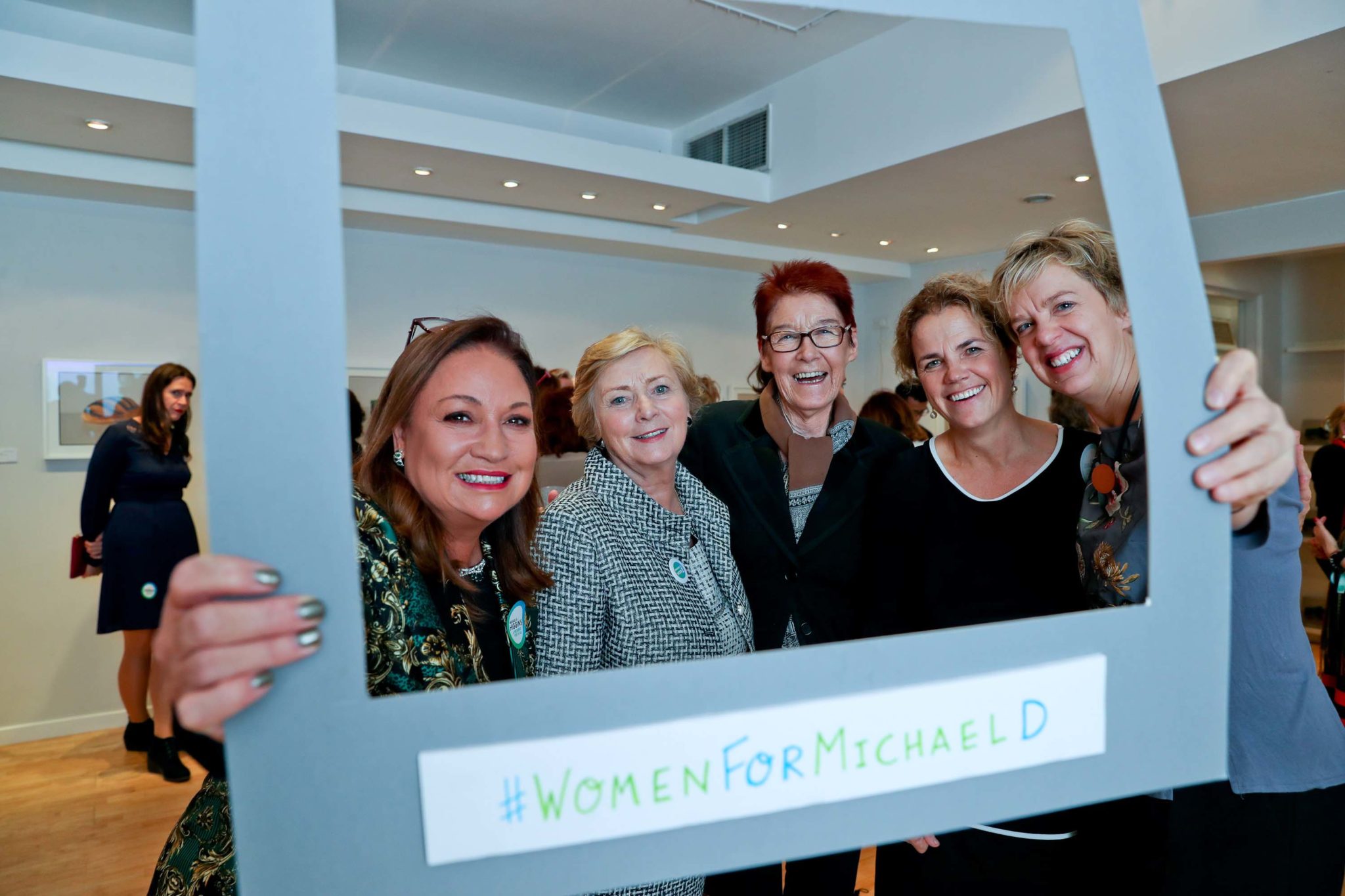 Women for Michael D. Higgins to return as President Of Ireland reception held in Solomon Gallery in Dublin. Pic shows from left Nora Casey , Frances Fitzgerald , Ailbhe Smyth , Denise Charlton and Ivana Bacik at a reception for Women who support Michael D. Higgins held in the Solomon Gallery in Dublin. Pic Maxwell's
Women for Michael D. Higgins to return as President Of Ireland reception held in Solomon Gallery in Dublin. Pic shows from left Nora Casey , Frances Fitzgerald , Ailbhe Smyth , Denise Charlton and Ivana Bacik at a reception for Women who support Michael D. Higgins held in the Solomon Gallery in Dublin. Pic Maxwell'sHow does Ivana feel that her brand of feminism is represented in the current Dáil?
“First of all, there are far too few women TDs. There’s only 37 – less than one-quarter of all TDs. That always surprises people because the women who are in the Dáil tend to be more visible than the men. The Seanad is 40% female, so it’s much better. But I’ve always wanted to try to get more women elected to the Dáil.
“Women clearly have very different views of feminism, depending on their own political allegiances and so on. There’s no one brand of feminism in the Oireachtas. There’s a very wide divergence of political views among us, including on feminist or gender issues. But obviously I would like to see more socialist and feminist women.
“In terms of feminism and generational change, feminism is always evolving. That’s what’s exciting about it. I taught feminist criminology in Trinity and feminist theories of law before that. It’s always evolving. My mother’s strong brand of feminism informed all of ours growing up. She would tell you that as soon as there was any fight for rights, there’s a backlash. Change is constant.”
It’s clear that the Labour leader’s family history has had a major influence on her life-path, with her Czech grandfather Charles Bacik coming to Waterford as a political refugee in 1946.
“He ran a glass factory near Prague before the Second World War, was later involved in the Czech resistance and was imprisoned by the Nazis for some years,” she recounts. “He was released but there was this shameful period in Czech history where the incoming Communist administration imprisoned those who fought with the resistance, alongside Nazi collaborators. A lot of the Czechs flew with the RAF and fought with the British army against Nazis. Then they went back to their liberated homeland to discover the Soviets were locking them up when they came in.
“Grandpa could see that was happening. Also, as a former factory owner, he wouldn’t have been in favour with the incoming regime. He came to Ireland with just suitcases and the kids, including my dad,” Ivana explains.
“Waterford Crystal had been established in the 18th century, but was closed down for many years. Grandpa revived the brand and set up a very small factory. He was then bought out by a wealthy Irish family called the McGraths and worked as a manager instead.
“He was written out of the history for years until John Hearne researched Grandpa’s role. In the ‘80s and ‘90s, he was the biggest employer in Waterford. It was a matter of huge, huge, huge sorrow to the people there that the factory closed down. It was devastating, but that was long after my Grandpa’s retirement and death.”
BUILD ALLIANCES AND DELIVER CHANGE
As child of a family that migrated from Eastern Europe, does Bacik regard the Irish government’s response to Russia’s appalling war in Ukraine as sufficient? While sanctions have been issued and four diplomats expelled, there is currently €34 billion held by opaque Russian-linked shell companies registered at the IFSC in Dublin.
“I’ve commended the Taoiseach for many of the actions himself and the government have taken. I believe in constructive politics, not just criticism for the sake of it,” Bacik informs me. “Ireland has been exemplary in welcoming refugees. More than 20,000 people have come so far and there’s been an amazing response. I visited our local Ukraine support centre, and it was incredible to see officials from so many government departments volunteering to support refugees. I’ve met many of them who have arrived with only a change of clothes and nothing more. It’s absolutely shocking to see the devastation Russia has caused. The solidarity we have shown in terms of humanitarian welcome has been really positive.
“However, at EU level and Security Council level we could do more [Since this interview took place, Russia has been suspended from the UN Human Rights Council by a vote of the UN General Assembly]. It’s good to see that we, along with a small group of other states, have called for the accession of Ukraine to the European Union. It’s good that we are assisting in non-military ways by giving aid, but we need to expel Russian ambassador Yuri Filotov.
“I stood outside the Saudi embassy on Saturday and spoke at an anti-war demo there for Yemen, because I think we need to be as vocal about Saudi Arabia’s violence. I was on the Foreign Affairs Committee when the war in Syria was raging – a proxy war that Putin was waging through Assad. The Siege of Aleppo had the same hideous tactics he’s now using in Mariupol. A lot of people on the left in Ireland wouldn’t call out Putin over that. It’s shameful, really. I suppose my own family history means I see Russia for the bullying, aggressive force it is and became further under Putin. He’s an utter dictator and it is very frightening to watch. He got away with what he did in Syria, so now he’s doing it in Ukraine. He’ll do it again if he is allowed.”
Would Labour be interested in a left-leaning coalition after the next election?
“I’ve always described myself as a socialist, a social democrat and as centre-left. That means that I stand for constructive politics, of seeking to deliver change by going into government. There are those further left than Labour who seem content to shout from the sidelines and certainly have no aspiration to be in government to deliver change.
“For me, that’s what being a progressive left or a constructive left is about. It’s about working to deliver actual change to the taxation system for redistribution of wealth to help achieve economic and social equality. That’s the purpose of politics. That’s why I joined Labour. That’s why I’m still in Labour three decades later.
“There is a distinction between Labour and those on the far left. There is a commonality on the left where we share positions on some things. I like that approach to politics. In the same way, I now look to work constructively with colleagues all across the board where there is a common purpose. The left has always been too factional, splintered and fragmented. Bringing people together is what I aim to do.
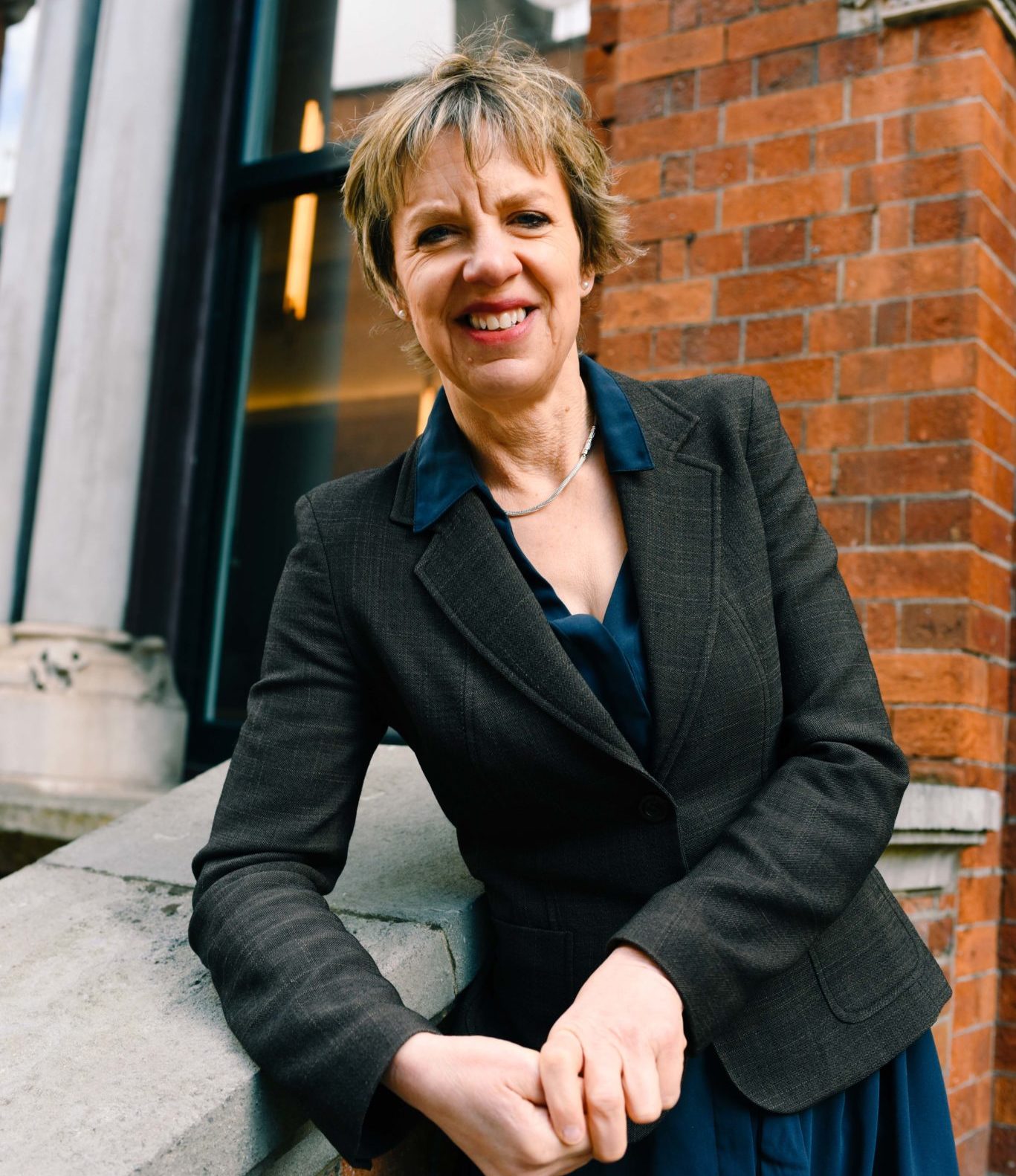 Ivana Bacik. Copyright Miguel Ruiz.
Ivana Bacik. Copyright Miguel Ruiz.“Labour will be running in the next General Election as a standalone party,” Bacik adds. “Ireland is unique in that we’ve never had a social democrat majority government. Never. I want to build that. I’ve always said that my ideal politics is a red-green alliance. I think it’s environmental and economic equality where we need to focus on. Especially now, in the climate emergency. That’s my dream, and I would work with colleagues from all parties to try to achieve it. If we just talk about who we go into government with, then we miss the point: you can also build alliances and deliver change on specific issues by building common ground.
“I got laws passed on a whole range of issues by working that way: on prohibition of female genital mutilation; on the right to conduct secular marriage ceremonies; and most recently to collect set minimum pay rates for freelance workers rights. The trade union movement are excited about that coming through.”
THREATENED PHYSICALLY AND ASSAULTED
Founded by Connolly and Larkin, Labour are the “political wing of the trade union movement” - according to Bacik. Does Ivana worry about Sinn Féin gaining ground in this area?
“We’ve always had to fight for every vote, every bit of support. Now more than ever, there’s really strong space for Labour voices to come through because no other party has the strong connections to the trade union movement that we have, historically and currently. No other party on the left has the network we have on the ground level. There have always been other parties who voters gravitate between. To me, Sinn Féin has taken a lot of the vote that went to Fianna Fáil.”
How do Labour policies on housing compare with Sinn Féin’s?
“Labour and Sinn Féin’s policies are different on a whole range of issues,” she says. “On housing, certainly, we and other parties are all calling for more construction. The big issue in housing is the active supply. We need building to be done quickly on public land in particular. It’s about the construction of social, affordable homes. I suspect if you looked across the policies of different parties you’d find that most parties are saying the same thing. There’s some divergence on how it’s delivered, but most parties in theory signed up to that.
“What might distinguish our policies is that, as a left-wing party, we support property taxes, a tax on wealth. I think it’s a populist position to call yourself a left-wing party and not to support a property tax, which is Sinn Féin’s position. Sinn Féin are a nationalist party. And, as a socialist, that’s not a space I want to be in, nor does Labour. We are a proudly internationalist party. We are a member of the Party of European Socialists. We’re also serious about environmentalism, so we support a carbon tax. Again, there’s dangerous, populist rhetoric among those who oppose that, and oppose property tax.”
What about the view that Labour and the Social Democrats are too similar to spot a difference?
“Tell me the difference between Fianna Fáil and Fine Gael policies,” she laughs. “That line of questioning misses a point. I’m about positive politics, not about denigrating anyone else’s. We are the only party that represents the trade union movement. We are also the only party that’s a member of the Party of European Socialists. We are the only party with the network of councillors, area reps and constituency members that is centre-left. Fianna Fáil were seen as the party of the trade union for a long time. Bertie Ahern made it a big point as Taoiseach. Before that, as Minister for Labour, he made a point of cultivating links for his party. Trade union members can vote for whichever party they choose. That’s democracy.”
What about the impact of social media on politics and politicians?
“I’m selective about my online presence,” she says. “It’s difficult, because no matter how thick a skin you develop – and I have developed one – it can still be painful to read really nasty comments. I do my own tweeting but I wouldn’t look too closely at tweets with my name in them, shall we say.”
Is there a comment that cut deepest?
“Where do I start? There’s just so many that are far too personal,” she shrugs. “That goes with the territory. I’ve been around long enough not to be too surprised by it, so online criticism or worse doesn’t put me out. When I started my political activism back in the late ‘80s, we were being threatened physically and assaulted, so things have improved from that point of view.”
RELATED

- Lifestyle & Sports
- 13 Jul 22
The Hog: Why Are We Still Running Up That Hill?

- Lifestyle & Sports
- 28 Oct 21
Vigil to remember Savita Halappanavar to take place tonight

- Lifestyle & Sports
- 25 May 21
Marginalised women face significant barriers to abortion care in Ireland, new report highlights
RELATED

- Lifestyle & Sports
- 04 Oct 19
Belfast court rules the Northern Ireland abortion ban breaches human rights

- Lifestyle & Sports
- 19 Dec 25
Tullamore D.E.W. Distillery: Gift an experience that engages every sense

- Lifestyle & Sports
- 15 Dec 25
Bohemian FC and KNEECAP team up for new jersey fundraising for ACLAÍ Palestine

- Competitions
- 12 Dec 25



